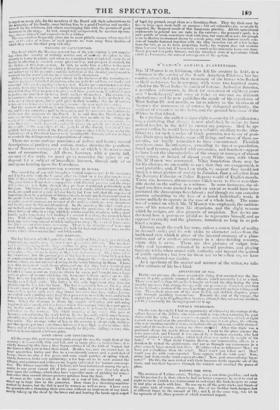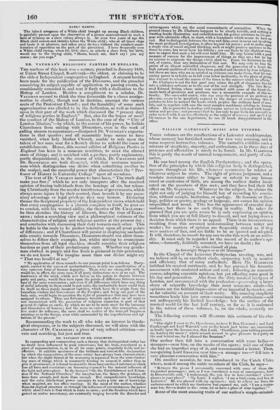M • MAHON'S JAMAICA PLANTEESIIIP.
...‘FMAnoN is an Irishman, who left his country in 1818, as a N'Oltlith'et in the service of the .S.,uth American Patriots ; but be- c•olnilttc(Iissittiqied with their treatment of the braves who flocked to their assistance. loe in company with some two hundred more, sailed fist. the NVe,,t in search of tia..tune. Arrived tit Jamaica, it penniless. zeivemorer, he lived tiur seventeen or eighteen years ;LS it " book-keeper," and once or twice as overseer on tilliiment plantations ; oral he in ov publishes the result of his experience of West Indian life and morels, so thr as relates to the treatment of .Neeroes. the management of estates by delegated authority, the conduct of executors to the heirs, and the general beheviour of the
Whites in that island.
In a preface, the male tt,,igns eight YetiSOnS forhisspublication ; Luis considering that shy:. . is now abolished, be seems to have arrived too late in the field to answer any purpose. Ilad he ap- peared earlier, he would have been a valuable auxiliary to the Abo- : ihr such it series of block portraits, not to say of posi- tive libels upon individuals, some still living., and most of them no- in/walla, we hardly ramember to have encountered. Fiendish cree!ty— gross licentiouseess, extending to incest —peculation, fraud. iind tyranny, mimied with cowardice, and bombast—appear to have been the characteristics of the owner or manager of almost every estate, or indeed of almost every White man, with whom "Mr. INFM.tuoN was connected. What foundation there may be fir his charges, we are unable to say; that they are exaggerated, is nest probable; and, if based on truth, we suspect they would not fornish a truer picture of society in Jamaica, than a selection from the Newgate Calendar or Police Reports would of English morals. There are, however, circumstances which seem to throw consider- able doubt on the author as a witness. In some instances, the al- leged cruelties were pushed to such an extent as would have inca- pacitated the slave-gangs from labour ; and though we can conceive passion submitting to the loss of a hated individuars work, it seems unlikely to operate in the ease of a whole body. The num- ber of estates on which Mr. M'INIAnox was employed, the sudden- ness of his removal from his situations, and the slight reasons which he assigns, are ids() grounds of suspicion. Nor do we un- derstand how a person so pitiful as be represents himself; and so opposed to cruelty and the planters, remained so long in so pol- luted a region.
Literary merit the work has none, unless a coarse kind of reality be deemed such ; and its sole claim to character arises from the incidental view which it gives of the internal economy of a plan- tation, and of a restless adventurer in a slave-holding country, where skin is caste. There are also pictures of vulgar bru- tality nod ignorance, animated by sensual passions, and playing Ilintastie tricks when armed with authority and beyond the control of public opinion ; but how titr these one to be relied on, we have already intimated our doubts.
As a specimen of the matter and manner of the writer, we take a few extracts of his best kind.
Al)VENTEEES AT SCA.
Durior• our pa-age. the most remarkable thing that occurred was the fre- quency of p, fly ytarrels amongst tlie officers, Whiell MY:ill:1111y It II to a duel.
There re than fifteen duels fought on hoard time ship during the two
mouths pa ; but, strange to t•ay., only one person was wound, 1, and that in the heel—th.• motion of the ves,i, perhaps, prevented them front taking good aim. '11e,, 11,.4-Is arose out of the most foolish 11101 cbildish disputes, gene- rally tin-ono:1a gambling transaction,. Towards the end of the voyage, the c:Iptain imt to this,altogoth,r. because, although they missed one another, y eon.-tautly hit the rigging and cut it up.
JAMAICA MILITIAMEN.
On the very Gnat night I had an opportunity Of witnesdng the courage of the valiant heroes of the :Militia, who Wert' :Nimbi as 1bm, %■11...11 torturing hlik' poor slaves with the whip. I V.a., a sentry en Isuard; and about teno'clock at night a crash was heard near tie guard-house : the instant it took place, 111,, officers, who were standing outside near me. unshed into the oat:nal-room, terriltly alarmed, aml lathed themselves ht. Laving me Moue ontside I After this there was a profound siblice for nearly fifteen minutes. I went to the place whence the 11,1i,-2 proceeded, and 1 fimuud it was caused by a drunken comrade, who had flooded against a rotten irding. which had given way tinder the weight of his hotly ! * * * That night Captain Ilrown, our commanditig officer. in a drunken fit visited the guard-room. awl put us through our 111:1111PILVMS in a place scarcely large enough to Iteld its. Ile addres•eil it as follows--•• Itlest 1. we have got a ihalcenge from th, rebel-. Men I won't vou follow me ? Men! won't you die with your captain? Your captain ivill the with you! Now, prime and load—make really—present—tire! sow. port arms--charge bayo- nets?" On this the men noshed with their bayonets to the opposite side of the room, and ran their bayou:is throngit the window and smashed the panes of glass.
EARLY HAIM&
The inbred arrogance of a White child brought up among Black children, is painfully pressed upon the observation of a person unaccustomed to such a land of tyranny as a slave colony always is. At even two years of age the Black child cowers and shrinks before the White child ; who at all time slaps and bents it at pleasure, and takes away its toys without the smallest mani- festation of opposition on the part.of the piccaninni. I have frequently seen a White child crying, when the little slave, so utterly a slave from his birth, would say to the crying " Massa, knock me, don't cry 1 you my massa ; me you nega.5



























 Previous page
Previous page